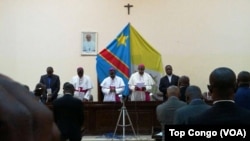The United States is committed to helping the Democratic Republic of the Congo find a peaceful way forward after President Joseph Kabila's second term in office ends on December 19. On October 18, the government concluded an agreement with several opposition groups, facilitated by the African Union (AU) that calls for elections in April of 2018.
The October 18 agreement was a step in the right direction, but its timeline for holding elections fails to meet the legitimate aspirations of the people of the DRC. In addition, important parts of the opposition did not take part in the discussions that led to the agreement.
The highly-respected DRC’s Conference of Catholic Bishops, or CENCO, is leading further discussions in pursuit of a more inclusive and strengthened agreement on the electoral calendar and transfer of power. The United States strongly supports CENCO in this role, given its credibility and neutrality, and believes its efforts provide the best chance of reaching a consensus agreement and guaranteeing the holding of elections.
"Supporting CENCO’s efforts is our top priority," said U.S. Special Envoy for the Great Lakes Region of Africa Tom Perriello recently. "I believe there is still a window for the Bishops to succeed." U.S. government officials are in near constant contact with stakeholders, including within the DRC government and the opposition, pressing them to work with CENCO in good faith and to prioritize consensus over individual or party gain.
The U.S. strongly believes that the key elements in an agreement likely to attract consensus include an electoral timeline that calls for presidential elections in 2017; a guarantee that the Constitution will not be amended and that President will Kabila not seek a third term; and electoral safeguards to ensure a free and fair election, including impartial electoral commission leadership.
The United States will continue to support efforts to advance democracy, stability, and prosperity for the people of the DRC.














